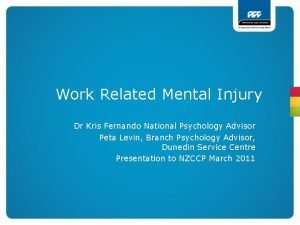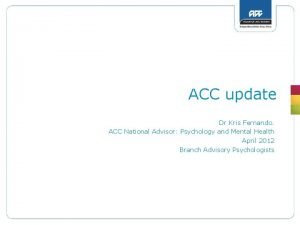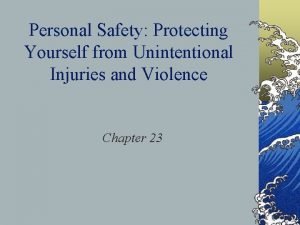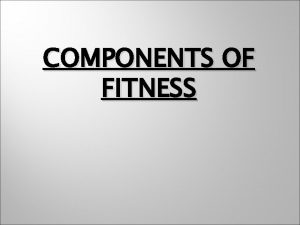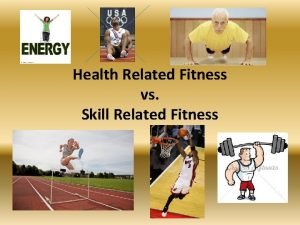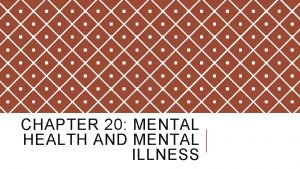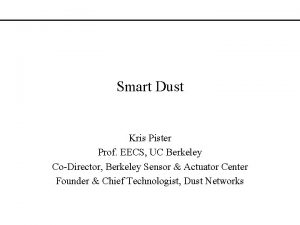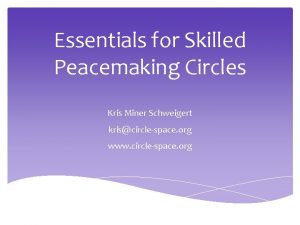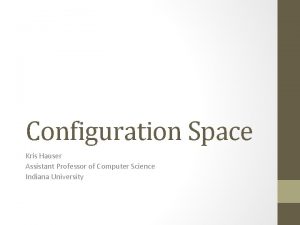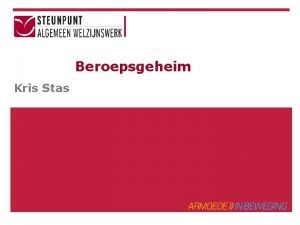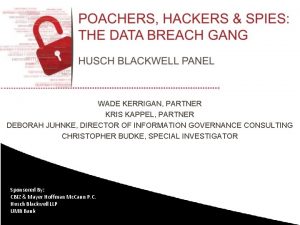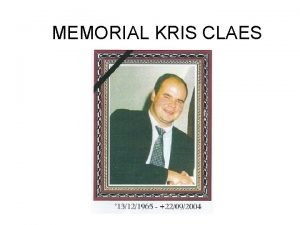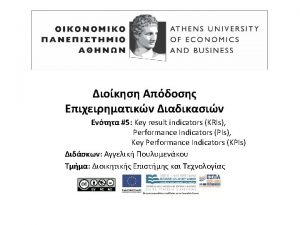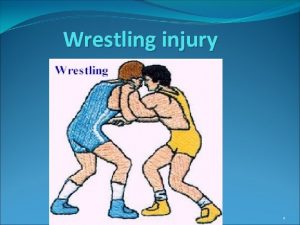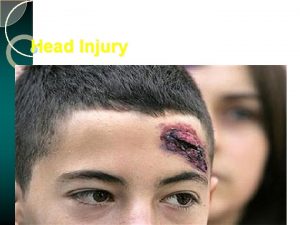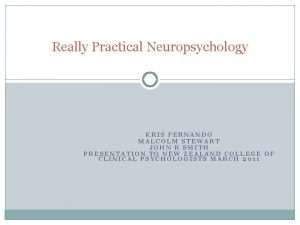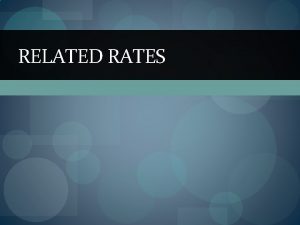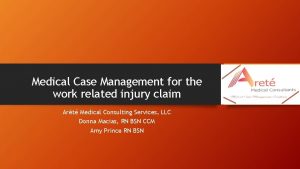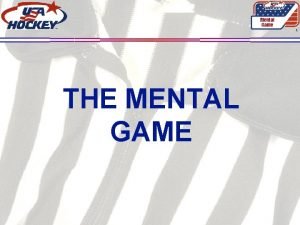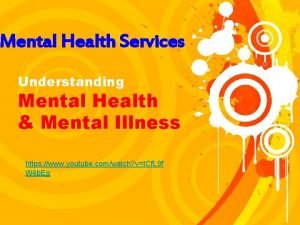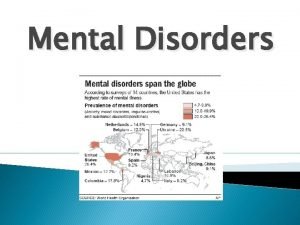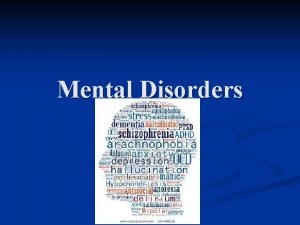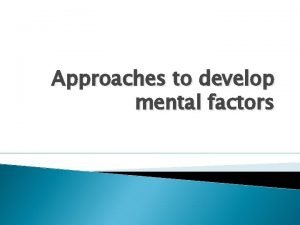Work Related Mental Injury Dr Kris Fernando National


















- Slides: 18

Work Related Mental Injury Dr Kris Fernando National Psychology Advisor Peta Levin, Branch Psychology Advisor, Dunedin Service Centre Presentation to NZCCP March 2011

Agenda • Recap on mental injury – Definition and Cover criteria • Work-related mental injury – Cover criteria, definitions – Reports

Recap on mental injury Cover is available for mental injury: a. because of physical injuries for which the person has cover including injury from accident, treatment injury etc b. sensitive claims c. work related mental injury Note: criteria must be considered in all cases Sections 21 and 21 B of the Act provide details

Mental Injury: Definition • mental injury defined in the AC Act 2001 • Section 27: Mental Injury means a clinically significant behavioural, cognitive, or psychological dysfunction • Recognised psychiatric/psychological condition: • Qualified person to provide assessment and report - Criteria

Sensitive Claims • Section 21: Cover for mental injury caused by certain criminal acts • No physical injury required • Does require that an act be performed on the client / victim by another person, and • A causal link between the act and the mental injury • The act is of a kind described in Schedule 3, major sex crimes such as sexual violation and indecent assault and others

Mental Injury as a consequence of physical injury • Section 26(1)(c) • mental injury suffered by a person because of physical injuries suffered by the person • Note: Woodd and other cases • ACC provides cover for mental injury if there is a direct causal link to a physical injury for which the person has cover • Referred under Psychological Services 6 hours – MIO 1 form

Work-related Mental Injury • Section 21 B introduced in 2008 • When the mental injury is caused by exposure to a traumatic event in the course of employment • Came into force on 1 October 2008 • Psychiatrists – mental injury reports

WRMI: Background • Experiencing traumatic events can affect people from no impact to severe long-term problems • Prior to 1 October 2008 there was no ACC cover for mental injury caused by exposure to a sudden traumatic event at work • Inconsistent with a number of overseas jurisdictions • High profile cases (milk tanker driver, train driver)

When: Date of injury • WRMI: the date on which the person first receives treatment for that mental injury “as that mental injury” • Same provision for sensitive claims • Note: for WRMI the date of first treatment must be after 1 October 2008

Who & Where: Relation to work • A person has cover for mental injury if: – they suffer the mental injury inside or outside New Zealand, and – It is caused by an event that meets criteria of ‘workrelated personal injury: section 28(1) • Section 28(1) – – At work On a meal break / rest break Travelling to or from work Travelling from work to get treatment for a workrelated personal injury

What: Defining the event • Section 21 (7) An event is: • Sudden event or a direct aftermath of a sudden event – Example: train driver witnesses a suicide and emergency workers who attend • A series of events from the same cause or circumstance that comprise a single event – Example: shop keeper accosted by an armed thief, bound and forced into a cupboard until the next day • Not a gradual process – Example: office worker with constant work demands

Cause: Sudden and traumatic • A sudden traumatic event that could reasonably be expected to cause mental injury in people generally • By that we mean: – – outside the range of ‘normal’ experience capable of provoking extreme distress in most people involves a real threat of significant harm would induce feelings of horror, alarm and shock in most people.

Causes injury in “people generally” • could reasonably be expected to cause mental injury in people generally • Does not mean: – people with similar underlying mental health conditions, or – people in similar occupations, or – the individual client

Causal link: Event to injury • The person has been directly exposed at work to a sudden traumatic event that could reasonably be expected to cause mental injury to the general population. • Does this person have a clinically significant behavioural, cognitive, or psychological dysfunction? • Was this mental injury caused by the sudden traumatic event ? • And, would this event cause a mental injury in people generally?

Reports: ACC 4247 • Psychiatric Assessment Report - Work-Related Traumatic Event • Guidelines for completion – Section A: Key terms and specific guidelines – Section B: ACC 2447 Guidelines for completion • • • Normal distress vs persistent dysfunction Collateral information Pre and post injury impairments Causal link vs final straw Routine assessment

Exclusions to WRMI • • • Not at work Event not directly experienced, seen, or heard Person not in close proximity to the event Temporary distress or no mental injury Mental injury not caused by the event Event is not significant enough to cause a mental injury in the general population • Gradual process

Contact Details • Kris Fernando kris. fernando@acc. co. nz • Peta Levin peta. levin@acc. co. nz • Duncan Frazer duncan. frazer@acc. co. nz • Peter Jansen peter. jansen@acc. co. nz

Branch Advisory Psychologists Vas Ajello Ann Galloway Duncan Frazer Rachel Vaughan Erin Eggleston Jane Lennan vas. ajello@acc. co. nz Whangarei/Henderson ann. galloway@acc. co. nz Auckland/Nth Harbour duncan. frazer@acc. co. nz Counties Manukau/IA/LS rachel. vaughan@acc. co. nz NP/PN/Mast. Wanganui erin. eggleston@acc. co. nz Rotorua/Whakatane/Taurang jane. lennan@acc. co. nz Hamilton/Gisborne/Haw Bay Christ Huelsmann Gillian Pow Fran Brinn Annie Maillard Jim Hegarty Peta Levin christoph. huelsmann@acc. co. nz Well/Porirua/Hutt/Nelson gillian. pow@acc. co. nz Sensitive Claimss frances. brinn@acc. co. nz Sensitive Claims annie. maillard@acc. co. nz Greymuth/Nthwood/Christchurch jim. hegarty@acc. co. nz Tim/Dun/Alex/ peta. levin@acc. co. nz Dunedin Service Centre
 Kris fernando
Kris fernando Kris fernando
Kris fernando How to protect yourself from intentional injuries
How to protect yourself from intentional injuries Two types of physical fitness
Two types of physical fitness Skill related fitness
Skill related fitness Mental health and mental illness chapter 20
Mental health and mental illness chapter 20 Mental illness mental health jeopardy
Mental illness mental health jeopardy Kris kmitl
Kris kmitl Kris pister
Kris pister överdeterminerad
överdeterminerad Kris francken oekraine
Kris francken oekraine Kris miner
Kris miner Kris k hauser
Kris k hauser Kris stas
Kris stas Wade kerrigan husch blackwell
Wade kerrigan husch blackwell Keith ferry -- norwich canaries
Keith ferry -- norwich canaries Kris kmitl
Kris kmitl Kris wui
Kris wui Kris pister
Kris pister
